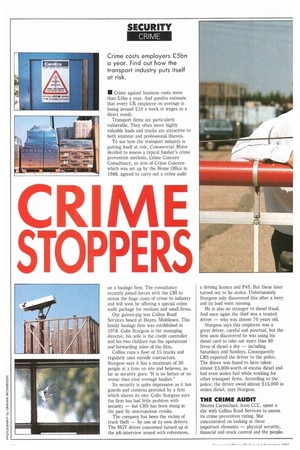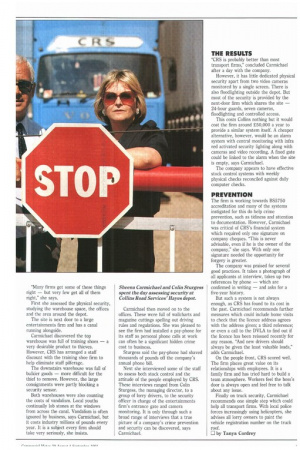CRIME STOPPERS
Page 30

Page 31

If you've noticed an error in this article please click here to report it so we can fix it.
• Crime against business costs more than Z5bn a year. And pundits estimate that every UK employee on average is losing around £10 a week in wages as a direct result.
Transport firms are particularly vulnerable. They often move highly valuable loads and trucks are attractive to both amateur and professional thieves.
To see how the transport industry is putting itself at risk, Commercial Motor decided to assess a typical haulier's crime prevention methods. Crime Concern Consultancy, an arm of Crime Concern which was set up by the Home Office in 1988, agreed to carry out a crime audit
on a haulage firm. The consultancy recently joined forces with the CBI to stress the huge costs of crime to industry and will soon be offering a special crime audit package for medium and small firms.
Our guinea-pig was Collins Road Services based at Hayes, Middlesex. This family haulage firm was established in 1978. Cohn Sturgess is the managing director, his wife is the credit controller and his two children run the operational and forwarding sides of the firm.
Collins runs a fleet of 15 trucks and regularly uses outside contractors. Sturgess says it has a maximum of 30 people at a time on site and believes, as far as security goes: It is no better or no worse than your average haulier."
Its security is quite impressive as it has guards and cameras provided by a firm which shares its site. Colin Sturgess says the firm has had little problem with security — but CRS has been stung in the past by unscrupulous crooks.
The company has been the victim of truck theft — by one of its own drivers. The HGV driver concerned turned up at the job interview armed with references, a driving licence and P45. But these later turned out to be stolen. Unfortunately Sturgess only discovered this after a lorry and its load went missing.
He is also no stranger to diesel fraud. And once again the thief was a trusted driver — who was almost 70 years old.
Sturgess says this employee was a great driver, careful and punctual, but the firm soon discovered he was using his diesel card to take out more than 80 litres of diesel a day — including Saturdays and Sundays. Consequently CRS reported the driver to the police. The driver was found to have taken almost £5,000-worth of excess diesel and had even stolen fuel while working for other transport firms. According to the police, the driver owed almost £15,000 in stolen diesel, says Sturgess.
THE CRIME AUDIT
Sheena Carmichael, from CCC, spent a day with Collins Road Services to assess its crime prevention rating. She concentrated on looking at three important elements — physical security, financial and stock control and the people. "Many firms get some of these things right — but very few get all of them right," she says.
First she assessed the physical security, studying the warehouse space, the offices and the area around the depot.
The site is next door to a large entertainments firm and has a canal running alongside.
Carmichael discovered the top warehouse was full of training shoes — a very desirable product to thieves. However, CRS has arranged a staff discount with the training shoe finn to help eliminate staff pilferage.
The downstairs warehouse was full of bulkier goods — more difficult for the thief to remove. However, the large consignments were partly blocking a security sensor.
Both warehouses were also counting the costs of vandalism. Local youths continually lob stones at the windows from across the canal. Vandalism is often ignored by business, says Carmichael, but it costs industry millions of pounds every year. It is a subject every finn should take very seriously, she insists. Carmichael then moved on to the offices. These were full of wallcharts and magazine cuttings spelling out driving rules and regulations. She was pleased to see the firm had installed a pay-phone for its staff as personal phone calls at work can often be a significant hidden crime cost to business.
Sturgess said the pay-phone had shaved thousands of pounds off the company's annual phone bill.
Next she interviewed some of the staff to assess both stock control and the attitude of the people employed by CRS. These interviews ranged from Cohn Sturgess, the managing director, to a group of lorry drivers, to the security officer in charge of the entertainments firm's entrance gate and camera monitoring. It is only through such a broad range of interviews that a true picture of a company's crime prevention and security can be discovered, says Carmichael. "CRS is probably better than most transport firms," concluded Carmichael after a day with the company.
However, it has little dedicated physical security apart from two video cameras monitored by a single screen. There is also floodlighting outside the depot. But most of the security is provided by the next-door firm which shares the site 24-hour guards, seven cameras, floodlighting and controlled access.
This costs Collins nothing but it would cost the firm around £50,000 a year to provide a similar system itself. A cheaper alternative, however, would be an alarm system with central monitoring with infra red activated security lighting along with cameras and video recording. A fixed gate could be linked to the alarm when the site is empty, says Carmichael.
The company appears to have effective stock control systems with weekly physical checks reconciled against daily computer checks.
PREVENTION
The firm is working towards BS5750 accreditation and many of the systems instigated for this do help crime prevention, such as tidiness and attention to documentation. However, Carmichael was critical of CRS's financial system which required only one signature on company cheques. "This is never advisable, even if he is the owner of the company," she says. With only one signature needed the opportunity for forgery is greater.
The company was praised for several good practices. It takes a photograph of all applicants at interview, takes up two references by phone — which are confirmed in writing — and asks for a five-year history.
But such a system is not always enough, as CRS has found to its cost in the past. Carmichael recommends further measures which could include home visits to check that the licence address agrees with the address given; a third reference; or even a call to the DVLA to find out if the licence has been reissued recently for any reason. "And new drivers should always be given the least valuable loads," adds Carmichael.
On the people front, CRS scored well. The firm places great value on its relationships with employees. It is a family firm and has tried hard to build a team atmosphere. Workers feel the boss's door is always open and feel free to talk about any issue.
Finally on truck security, Carmichael recommends one simple step which could help all transport firms. With local police forces increasingly using helicopters, she advises all lorry owners to paint the vehicle registration number on the truck roof.
CI by Tanya Cordrey
















































































